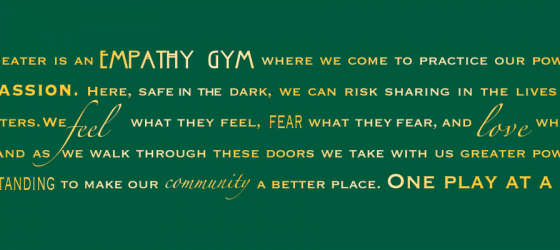The Reports of Theatre’s Death Have Been Greatly Exaggerated.
Is the theatre really dead? – Paul Simon
When Mark Twain wrote his famous quip in 1897, it was his own prematurely announced death he was referring to. But the phrase seems fittingly applied to the most notoriously struggling art form, the theatre. Why does it seem that the oldest performing art, born in Neolithic caves and treetops, is always on the edge of extinction?
Another great American writer, John Steinbeck, who dabbled in the theatre, put it this way: “The theater is the only institution in the world which has been dying for four thousand years and has never succumbed. It requires tough and devoted people to keep it alive.”
The longest recorded hiatus for theatre came at the fall of the Roman Empire. Not called the dark ages for nothing, theatre disappeared from the meager historic records in Europe for a few hundred years. If we were restricted to the “Western-centric” view of things, we might say, “well, theatre did die.” In the East, however, theatre in China thrived from 2000 B.C. straight through to the present without documented break. Drama was considered the highest form of Sanskrit literature. Theatre in India also began several millennia B.C., and like western theatre, was squashed by Muslim invaders around 1000 A.D. for a couple hundred years. But looked at globally, Mr. Steinbeck was right. Theatre has persisted, at the edge of its demise, for a steady 4000 years.
The incredibly vibrant renaissance British theatre was squashed by another religious movement, the Puritans, in the early 17th Century. The Globe was burned and actors jailed. But across the channel, French theatre was just hitting its zenith with Moliere, Racine, Corneille. And after only a couple decades, the British royalty who had fled to Paris returned to England, bringing with them the idea of indoor theatres, the raked stage, and female actors, ushering in the brilliant blossoming of restoration comedy.
The bubonic plague closed theatres many times from the middle ages through the 18th century, but actors and playwrights always roared back with a passion. Some even credit the London plague of 1601-2 with giving Shakespeare the space to pen the great tragedies King Lear, Macbeth, and Antony and Cleopatra, which all appeared shortly after in quick succession.
Our founding fathers, right as they were about many things and wrong about many others, were wrong about the theatre. Immediately after the revolution, they tried to outlaw theatre with the Articles of Association. The Articles called to “discountenance and discourage every species of extravagance and dissipation, especially… exhibitions of shows, plays, and other expensive diversions.”
The Spanish Flu of 1918-19 closed theatres, but Broadway soon came roaring back to one of its most successful decades. British theatre artists flat refused to close their theatres during the Blitz, either performing for a few brave patrons while bombs rained down or going underground to stage plays in bomb shelters. Later in the war, actors were spared the military draft by being deemed essential workers. Hitler demanded that the arts be purged, including the theatre, which he compared to “side shows in depravity.” And yet, theatre persisted, underground, in the back rooms of taverns, within the Jewish ghettos, and in the concentration camps, by prisoners at Sachsenhausen, Dachau, and Ravens Bruck, and secret night-time performances in the infirmaries of Auschwitz.
During the explosive expansion of movie theatres during the 20s, critics were convinced live theatre would perish. And yet theatre ticket sales soared in the 20s. Pundits and critics were positive that television would kill the theatre in the 50s and yet that decade became what many consider to be the golden age of American theatre. Now we have COVID-19, which has shut down theatre along with sports and concerts, and we are faced again with the question, “Will theatre survive?”
It is certain that some individual theatres may not survive, and indeed, some have already succumbed to the hardship brought on by the pandemic. And I am convinced that theatre will be changed forever. How? No one knows. But we can be sure that playwrights, the prophets of our time, will figure that out.
Like the strike of a match, theatre exists only in the moment, in the encounter between actor and audience. It may be the very ephemeral nature of theatre which makes us fear it will be snuffed out. How could something so intangible endure? After the moment is gone, there is nothing for us to hold onto. But perhaps it is not actually theatre that is eternal or essential. It is the encounter between live humans in the act of telling stories.
As Jerzy Grotowski said, theatre exists “to cross the frontiers between you and me.” There will always be live storytelling where someone plays a role. My four-year old granddaughter writes 30-40 plays per day. And even though—and maybe because of—Tom Stoppard’s description of theatre as “a series of insurmountable obstacles on the road to imminent disaster,” we can rest assured that through this crisis, as all others before it, theatre will not only prevail, but prosper.
I assure you that we at San Francisco Playhouse are among “those tough dedicated people” Steinbeck spoke of, and as long as humans come together to experience a story told live in front of them, the storytellers will find a stage.
Please write me at [email protected] to share any thoughts you may have.
Love,
Bill English (Artistic Director)



